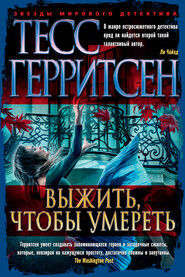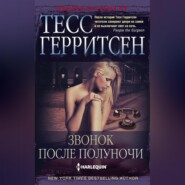По всем вопросам обращайтесь на: info@litportal.ru
(©) 2003-2024.
✖
In Their Footsteps / Stolen: In Their Footsteps / Stolen
Автор
Год написания книги
2018
Настройки чтения
Размер шрифта
Высота строк
Поля
“I’ve always thought you were a saint just to let that bitch in your door,” said Helena. “If it were up to me…”
“One must keep the peace” was all Marie said.
They tried to carry on a conversation, the four of them, but so many silences intervened. And overshadowing their talk of bomb blasts and ruined furniture, of lost artwork and damaged heirlooms, was the sense that something was being left unsaid. That even beyond the horror of these losses was a deeper loss. One had only to look in Marie St. Pierre’s eyes to know that she was reeling from the devastation of her life.
Even when her husband, Philippe, walked into the room, Marie did not perk up. If anything, she seemed to recoil from Philippe’s kiss. She averted her face and looked instead at the door, which had just swung open again.
Claude Daumier entered, saw Beryl, and halted in surprise. “You are here?”
“We were waiting to see you,” said Beryl.
Daumier glanced at Richard, then back at Beryl. “I have been trying to find you both.”
“What’s wrong?” asked Richard.
“The matter is…delicate.” Daumier motioned for them to follow. “It would be best,” he said, “to discuss this in private.”
They followed him into the hallway, past the nurses’ station. In a quiet corner, Daumier stopped and turned to Richard.
“I have just received a call from the police. Colette was found shot to death in her car. Near Place Vendčme.”
“Colette?” said Beryl. “The agent who was watching Jordan?”
Grimly Daumier nodded.
“Oh, my God,” murmured Beryl. “Jordie—”
“He is safe,” Daumier said quickly. “I assure you, he’s not in danger.”
“But if they killed her, they could—”
“He has been placed under arrest,” said Daumier. His gaze, quietly sympathetic, focused on Beryl’s shocked face. “For murder.”
LONG AFTER EVERYONE ELSE had left the hospital room, Helena remained by Marie’s bedside. For a while they said very little; good friends, after all, are comfortable with silence. But then Helena could not hold it in any longer. “It’s intolerable,” she said. “You simply can’t stand for this, Marie.”
Marie sighed. “What else am I to do? She has so many friends, so many people she could turn against me. Against Philippe…”
“But you must do something. Anything. For one, refuse to speak to her!”
“I have no proof. Never do I have proof.”
“You don’t need proof. Use your eyes! Look at the way they act together. The way she’s always around him, smiling at him. He may have told you it was over, but you can see it isn’t. And where is he, anyway? You’re in the hospital and he scarcely visits you. When he does, it’s just a peck on the cheek and he’s off again.”
“He is preoccupied. The economic summit—”
“Oh, yes,” Helena snorted. “Men’s business is always so bloody important!”
Marie started to cry, not sobs, but noiseless, pitiful tears. Suffering in silence—that was her way. Never a complaint or a protest, just a heart quietly breaking. The pain we endure, thought Helena bitterly, all for the love of men.
Marie said in a whisper, “It is even worse than you know.”
“How can it possibly be any worse?”
Marie didn’t reply. She just looked down at the abrasions on her arms. They were only minor scrapes, the aftermath of flying glass, but she stared at them with what looked like quiet despair.
So that’s it, thought Helena, horrified. She thinks they’re trying to kill her. Why doesn’t she strike back? Why doesn’t she fight?
But Marie hadn’t the will. One could see that, just by the slump of her shoulders.
My poor, dear friend, thought Helena, gazing at Marie with pity, how very much alike we are. And yet, how very different.
A MAN SAT ON THE BENCH across from him, silently eyeing Jordan’s clothes, his shoes, his watch. A well-pickled fellow by the smell of him, thought Jordan with distaste. Or did that delightful odor, that unmistakable perfume of cheap wine and ripe underarms, emanate from the other occupant of the jail cell? Jordan glanced at the man snoring blissfully in the far corner. Yes, there was the likely source.
The man on the bench was still staring at him. Jordan tried to ignore him, but the man’s gaze was so intrusive that Jordan finally snapped, “What are you looking at?”
“C’est en or?” the man asked.
“Pardon?”
“La montre. C’est en or?” The man pointed at Jordan’s watch.
“Yes, of course it’s gold!” said Jordan.
The man grinned, revealing a mouthful of rotted teeth. He rose and shuffled across the cell to sit beside Jordan. Right beside him. His gaze dropped speculatively to Jordan’s shoes. “C’est italienne?”
Jordan sighed. “Yes, they’re Italian.”
The man reached over and fingered Jordan’s linen jacket sleeve.
“All right, that’s it,” said Jordan. “Hands to yourself, chap! Laissez-moi tranquille!”
The man simply grinned wider and pointed to his own shoes, a pair of cardboard and plastic creations. “You like?”
“Very nice,” groaned Jordan.
The sound of footsteps and clinking keys approached. The man sleeping in the corner suddenly woke up and began to yell, “Je suis innocent! Je suis innocent!”
“M. Tavistock?” called the guard.
Jordan jumped at once to his feet. “Yes?”
“You are to come with me.”
“Where are we going?”
“You have visitors.”
The guard led him down a hall, past holding cells jammed full with prisoners. Good grief, thought Jordan, and he’d thought his cell was bad. He followed the guard through a locked door into the booking area. At once his ears were assaulted with the sounds of bedlam. Everywhere phones seemed to be ringing, voices arguing. A ragtag line of prisoners waited to be processed, and one woman kept yelling that it was a mistake, all a mistake. Through the babble of French, Jordan heard his name called.

















